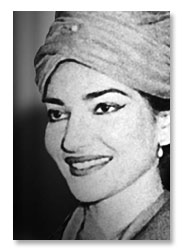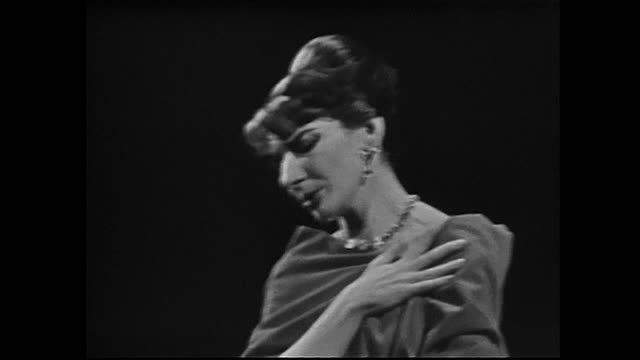

Maria Callas’s father changed the family name from Kalogeropoulos to Callas in 1929, when he opened a pharmacy in the Greek quarter of Manhattan. Both her parents were Greek, arriving in the USA in the year of her birth. Having received her first piano lessons as early as 1932, she was later able to prepare roles without the assistance of a repetiteur. Her parents separated in 1937 and together with her mother and sister Callas returned to Greece.
Here she entered the National Conservatory in 1938, studying singing with Maria Trivella and making her stage debut in a student production during the following year as Santuzza / Cavalleria rusticana, after which Elvira de Hidalgo became her teacher, concentrating upon coloratura training. Callas’s professional operatic debut took place in Athens in 1941 as Beatrice / Boccaccio (Suppé) with the Lyric Theatre company, with whom she went on to sing the title role in Tosca (1942), as well as Marta / Tiefland (1943), Leonore / Fidelio (1944) and Laura / Der Bettelstudent (1945). Following the liberation of Greece in 1944 she decided to return to America to seek her father and in 1945 gave her first recital in Athens to raise funds; she auditioned for the Metropolitan Opera, New York at the end of the year, but without success.
Despite a lack of work Callas practised rigorously and eventually was engaged to sing in Turandot in Chicago for a company that went bankrupt before the scheduled performances could take place. One of her fellow company members, Nicola Rossi-Lemeni, introduced her to Giovanni
Zenatello, then looking for singers for the opera festival at the Verona Arena of which he was artistic director; he engaged her to sing the title role in La Gioconda at Verona in the summer of 1947. Shortly after rehearsals began Callas met the industrialist Giovanni Meneghini, who in 1949 became her husband and subsequently her manager.
The Verona performances were conducted by Tullio Serafin, who became a key mentor, engaging Callas to sing Isolde / Tristan und Isolde at the end of the year at the Teatro la Fenice, Venice. This led to further engagements including the title roles in Turandot and Norma (Florence, 1948). At the beginning of 1949 she sang Brünnhilde / Die Walküre at La Fenice. In the same season Margherita Carosio was scheduled to sing Elvira / I puritani and when she fell ill Serafin persuaded Callas to substitute for her, which she did with such success that the Italian bel canto repertoire was to become a major focus of her future career on-stage.
During 1949 Callas sang the title roles in Norma, Aida and Turandot at the Teatro Colón, Buenos Aires with Serafin conducting; appeared as Kundry / Parsifal at the Rome Opera followed by Isolde in 1950, the year in which she made her debut at La Scala, Milan in the title role of Aida, substituting for Renata Tebaldi. In the same year in Mexico City, within the space of one month she sang the title parts in Norma, Aida and Tosca and Leonora / Il trovatore.
After singing Elena / I vespri siciliani at the 1951 Florence Maggio Musicale with Erich Kleiber conducting, Callas made her scheduled debut at La Scala, opening the 1951–1952 season with the same role. In the following summer of 1952 she signed an exclusive recording contract withthe Columbia label of EMI, negotiated by Walter Legge, who was the producer for the majority of her commercial recordings. These began with Lucia di Lammermoor, made in Florence during 1953, and strongly assisted the establishment of her global reputation.
At La Scala, where she was known as ‘La regina della Scala’, Callas became the focus for a process of extraordinary artistic renewal, predominantly led by the stage director Luchino Visconti who stated that it was largely because of Callas that he began to direct opera. He directed her in productions of La vestale (Giulia, 1954), La traviata (Violetta, 1955), La sonnambula (Amina, 1955), Anna Bolena (Anna, 1957) and Iphigénie en Tauride (Iphigénie, 1957). Other extraordinary performances at La Scala included Lucia / Lucia di Lammermoor (1954), Maddalena / Andrea Chénier (1955) and Amelia / Un ballo in maschera (1957). Through Callas the bel canto repertoire was rediscovered; and in addition, with Visconti directing, a new standard was established for opera as dramatic truth.
Callas’s international career was swiftly launched. She made her debut at the Royal Opera House, London as Norma in 1952 and returned regularly: notable appearances included Aida (1953), Violetta (1958), Cherubini’s Medea (1959) and Tosca (1964). At the end of 1954 she returned to the USA to sing in productions of Norma, La traviata and Lucia di Lammermoor with the young Lyric Opera of Chicago. She opened the 1956–1957 Metropolitan Opera season as Norma, followed by Tosca, Lucia di Lammermoor and La traviata. Difficulties followed in 1958. In January Callas walked out of a performance of Norma at the Rome Opera in front of the Italian president. The reason was illness, but much hostile press comment ensued. She then quarrelled with both Antonio Ghiringhelli, intendant of La Scala, deciding not to sing there while he was in charge, and also with the manager of the Metropolitan Opera, Rudolf Bing, with whom she could not agree repertoire. However at the end of the year, following successful performances as Cherubini’s Medée (Medea) for the Dallas Civic Opera, she made a sensational debut at the Paris Opera, arousing the interest of the Greek shipping magnate, Aristotle Onassis.
By the following year Callas and Onassis were lovers and her marriage to Meneghini ended. From 1960 she led an extremely full social life with Onassis, performing very little. Although persuaded to return to opera by Franco Zeffirelli, who directed her in a legendary production of Tosca at the Royal Opera House in 1964, mounted in minimal time but with maximal results, by now Callas’s performing career was almost over. She gave a series of performances as Tosca in Paris, returned to the Met for a further two and then essayed further performances of Norma in Paris, which she was unable to complete. She made her final operatic appearance at Covent Garden as Tosca in July 1965 at a royal gala performance.
When Onassis married Jacqueline Kennedy in 1968, Callas’s relationship with him was effectively ended. During 1971 and 1972 she gave a series of master-classes at the Juilliard School in New York, where she rekindled her friendship with the tenor Giuseppe di Stefano. Although she undertook a world tour with him during 1973 and 1974 to raise funds for the medical treatment of his daughter, her severe vocal decline was evident. Following Onassis’s death in 1975 Callas became a recluse in Paris, where she died two years later. Subsequent analysis has suggested that her death was ultimately caused by dermatomyositis, a disease that causes muscle failure including that of the larynx, and the treatment for which may trigger heart failure.
Callas possessed a voice of great range and power, with which she was able to generate a formidable dramatic intensity. At her peak her identification with the characters she portrayed on-stage was so complete as to mesmerize entire audiences. Setting herself extremely high standards, she expected the same of those with whom she worked. She left a vast legacy of recordings, her studio performances being supplemented by a huge catalogue of live performance recordings. Her achievement has been well summed up by the conductor Carlo Maria Giulini who commented of her: ‘If melodrama is the ideal unity of the trilogy of words, music and action, it is impossible to imagine an artist in whom these three elements were more together than Callas.’
© Naxos Rights International Ltd. — David Patmore (A–Z of Singers, Naxos 8.558097-100).
| Title | |
| CLASSIC ARCHIVE - Celebrating Verdi (Callas, Gobbi, NBC Symphony, London Symphony, Toscanini, Giulini, Sebastian, Mackerras) (1943-1968) | |

|
CLASSIC ARCHIVE - Celebrating Verdi (Callas, Gobbi, NBC Symphony, London Symphony, Toscanini, Giulini, Sebastian, Mackerras) (1943-1968)
Composer:
Verdi, Giuseppe
Artists:
Callas, Maria -- Giulini, Carlo Maria -- Gobbi, Tito -- London Symphony Orchestra -- Mackerras, Charles -- NBC Symphony Orchestra -- New Philharmonia Chorus -- New Philharmonia Orchestra -- Paris Opera Orchestra -- Sebastian, Georges -- Toscanini, Arturo
Label/Producer: EuroArts |
